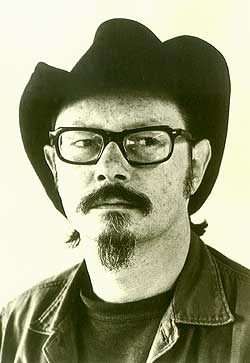
|
This is Jacket 12, July 2000 | # 12 Contents | Homepage | Catalog | |
Laurie Duggan“ Mister P.B.” — on Paul Blackburn |
|
THE LANGUAGE OF POETRY — even when it allows for amphetamines, smashed cars, and parked tigers* — is often a high language. Its conventions become like the diatonic scale: an aid to writing music, but not the guarantor of music. Sometimes a poetry can appear so “ effortless” that its critics assume there’s been no effort, or ignore it — ignoring also perhaps one who doesn’t set himself up as an avatar (and the person who writes this kind of poetry is hardly likely to). And what can you say about the ease of a work like In, On or About the Premises (1968)? The blind man with the Wallace Beery These moments are clear, precise, beautiful, with none of that juggling for effect that characterises lesser writers. Paul Blackburn calls into question, as any really good poet does, the notion of “ slightness". What is “ slight"? Sappho? Catullus? A man falling down is as worthy a subject as the Fall Of Man, and the lightest things will last — witness the song Wordsworth heard. Witness Thomas Wyatt. If you want to live forever, shed your baggage.  “ I like", saith the poet, “ French food, Greek wines, Spanish cognac and Italian women. (My) tastes are broad and indelicate: (I) would gladly settle for Italian food, French wines, Spanish cognac and Greek women.” He admires “ California for its greenness and Utah for its rocks and aridity; Zen Buddhists for their waterfalls and the Hopi Indians for having determined that certain parts of New Mexico and Arizona are the center of the world, a conclusion with which he agrees." |
|
What operates on such a poet? Provençal, which he translated at length (see Proensa, a book started in the early fifties and constantly revised and added to). The Provençal bards taught Blackburn to sing. His poems, careless of appearance, generate an intense music: Mercury! Post of Heaven, you old thief, deliver me
For music, who to look to in the early fifties but Pound, William Carlos Williams (the ever present), and jazz. In Blackburn’s poetry there is the improvisatory ease you’d find in a Dexter Gordon. Take “ Ciao", which is at once Sappho and mid-century cool: I’m sorry
Or take the way familiar lines are dropped into a poem with an effortlessness which renders them appropriate in a very different context: Watching her high backside sway and swish down that
Eliot, Frost, Yeats &c have become gestures, like blackface note-for-note imitations of Louis Armstrong, in the work of bad poets. The powerful, brilliant and inventive declines to cuteness — and one way to give things a shove in the right direction is to undermine their talismanic efficacy. So a trumpeter like Lester Bowie can cavort, showmanlike, in a white lab coat and blast all else off stage: it is love and criticism and righteous anger become one. Returning from the funeral
or: . . . in the shallow doorway of
The comparison is not purely arbitrary; there are similar kinds of attention at work, picking up the minutiae of sidewalk life and casting them in shapes which are casual and rock-solid at once, like Imagism going for a walk after a few drinks. but now I know what thing is worth the having
But Blackburn moved on, further into the Provençal canon, so that it became the single most important influence on his own work. Protect the mysteries!
So the convoluted wit of: To be a spot-headed cat on a forked tree
moves to: Women are vowels I hear the crashing wave
The balances between laughter, love and death are as fine and as clear as the 12th century masters would have it, before the atomistic distinctions between genres spoiled the fun. Though the costs of such attentions are measured here. I want pity from no one for a pain
The lines from Jaufre Rudel, which Blackburn appends to one of his last authorial statements, take these costs long distances from the self-obsessed wallowings of a Lowell or a Berryman. It is a bardic confidence — “ not of the poet but through him” which leads to a “ lightness” (or lack of heavyness); the load is not upon the reader’s shoulders. It’s going to rain
Lightness, playfulness, bring into balance a civil engineering project and the origins of the alphabet (and in there, Pound’s “ slowness is beauty"). The men watch
And the whole — a mind moving on paper — and a mind which is several sheets to the wind at once contains and enacts. This is no display of spoon-fed information. The watchers leave the construction site,
When Paul Blackburn died, aged forty-six, in 1971, little of his work was available. The only easily obtainable volume (then) — The Cities (Grove, 1967) — contained less than half of its original manuscript. Since then a number of small books have come out, notably from Black Sparrow and Mulch presses, but a collected edition has yet to appear. [This piece was published in 1986. Ed.] When it does, a remarkable oeuvre will become fully apparent: work which will live outside exegetical fashion, as mysterious and as clear as ever.... The bricklayer tells the busdriver
The poems will take their place. Not shadow boxes, baby, but Two Vast & Trunkless Legs of Stone. L.D., 1986 |
|
Proensa ed. George Economou, University of California Press, 1978. |
|
Jacket 12 Contents page |